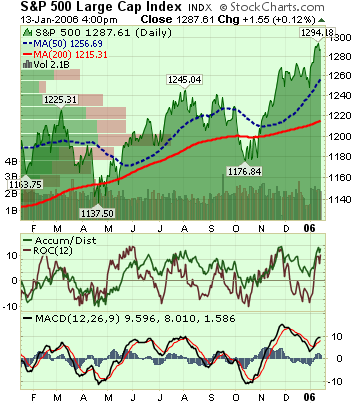
Click here for the Weekly Wrap by Briefing.com.
BOTTOM LINE: Overall, last week's market performance was modestly positive as the S&P 500 consolidating recent gains. The advance/decline line was about even, most sectors rose and volume was above average on the week. Measures of investor anxiety were mostly higher. However, the AAII % Bulls jumped to 58.96. I would become worried on sustained readings above 60.0% in this contrary indicator. The average 30-year mortgage rate fell to 6.15% which is only 94 basis points above all-time lows set in June 2003. Moreover, the benchmark 10-year T-note yield fell another 2 basis points on the week as economic data was mixed and measures of inflation decelerated further.
Small-caps outperformed on optimism over increased corporate spending and lower long-term interest rates. Unleaded Gas futures resumed their downtrend, notwithstanding rising worries over Iran’s nuclear ambitions, and are 40% below September highs even as refinery utilization remains below normal as a result of the hurricanes. Natural gas supplies fell less than expected this week and are now 11.8% above the 5-year average for this time of year even as over 19% of daily Gulf of Mexico production remains shut-in. Natural gas prices have plunged around 45% in 4 weeks. Gold rose on the week, reaching a 24-year high, as the dollar declined and international diversification continued.
I still believe prices for many commodities are being driven by fear and record capital inflows into commodity funds, rather than fundamentals. I continue to expect global energy demand destruction, decelerating economic growth and a significant increase in supplies into 2006 to push oil prices substantially lower from current levels. The ECRI Weekly Leading Index made a new cycle high and is forecasting healthy US economic activity. Recent gains in the Homebuilders and Retailers are a big positive as the bears’ main arguments revolve around these two sectors. Consumer spending, while slowing, should remain healthy as long-term interest rates stay low, inflation decelerates, energy prices fall, the dollar remains stable, the job market remains healthy, consumer confidence improves and the stocks market rises. These large positives should more than offset a housing market that is slowing to more healthy sustainable levels.
*5-day % Change
No comments:
Post a Comment